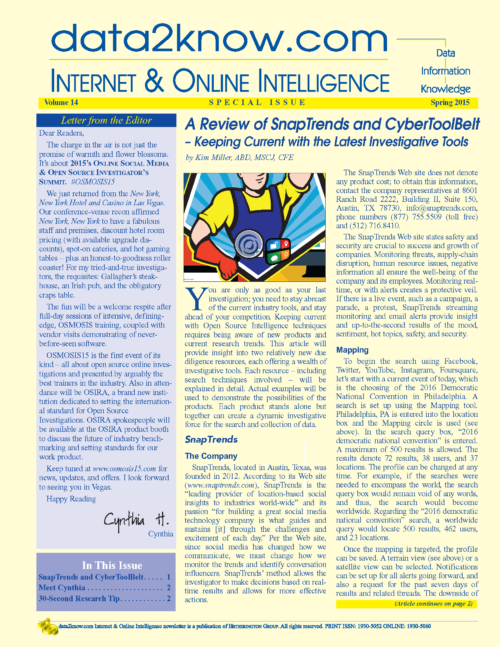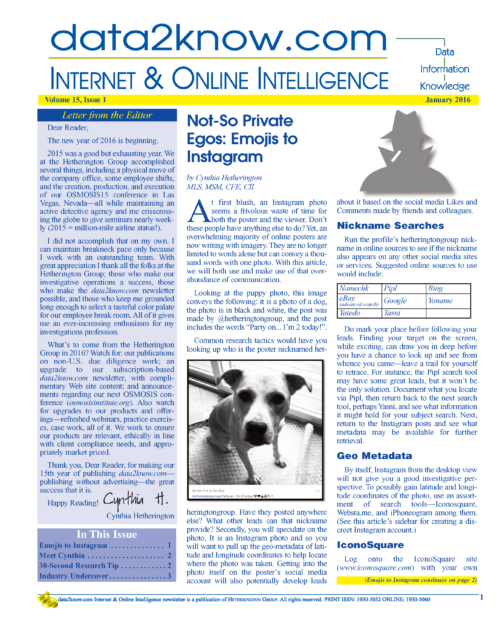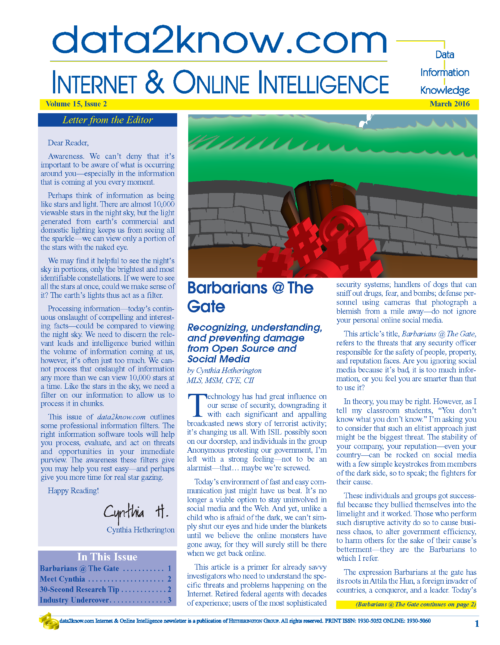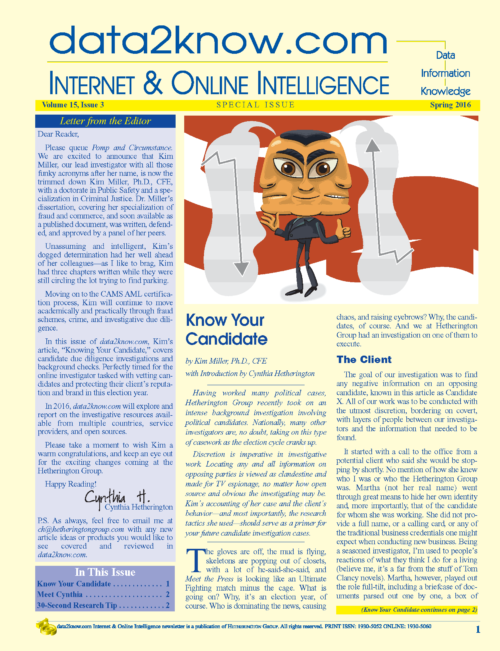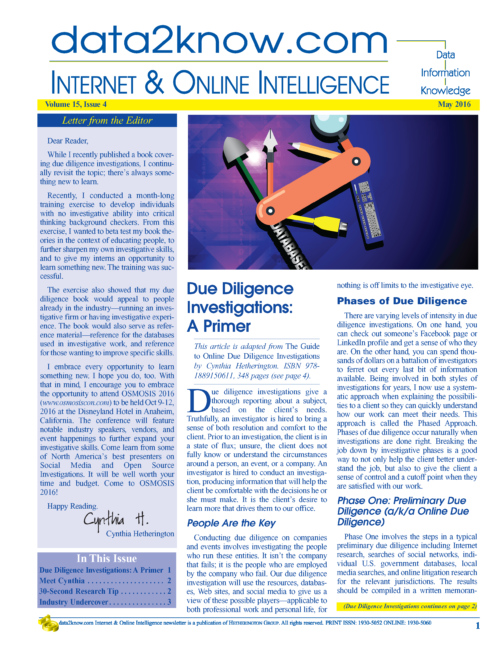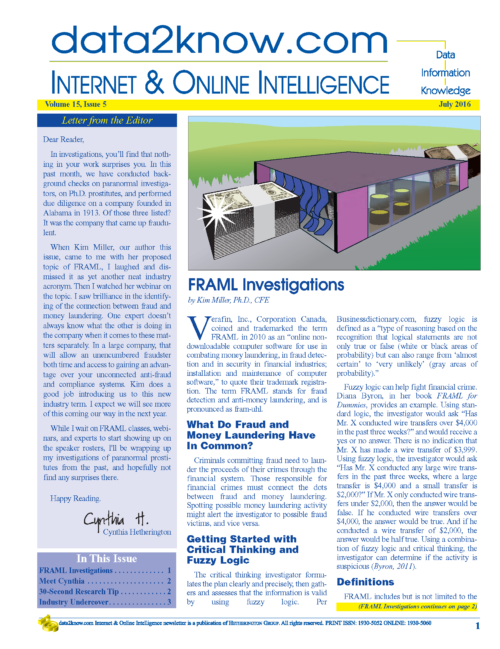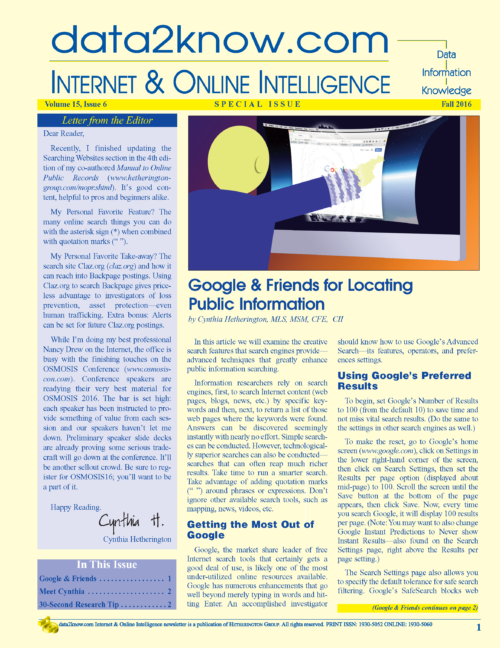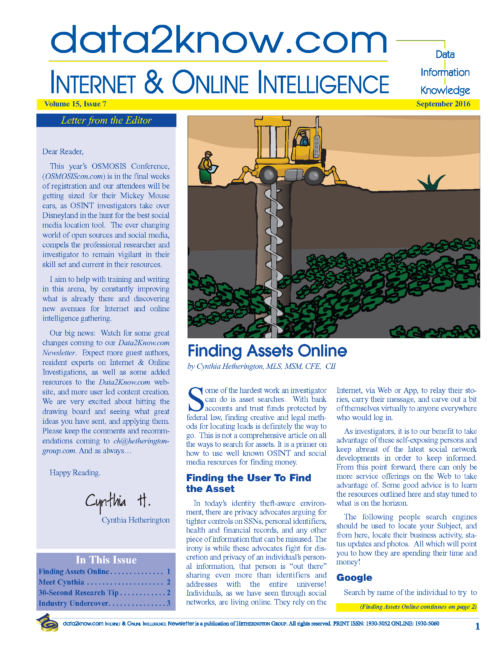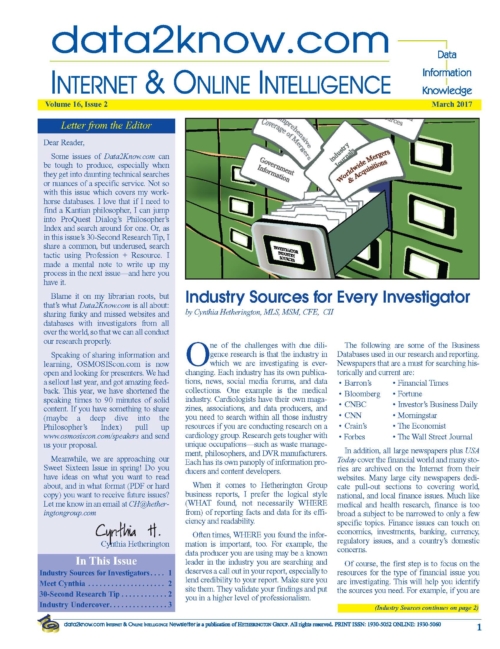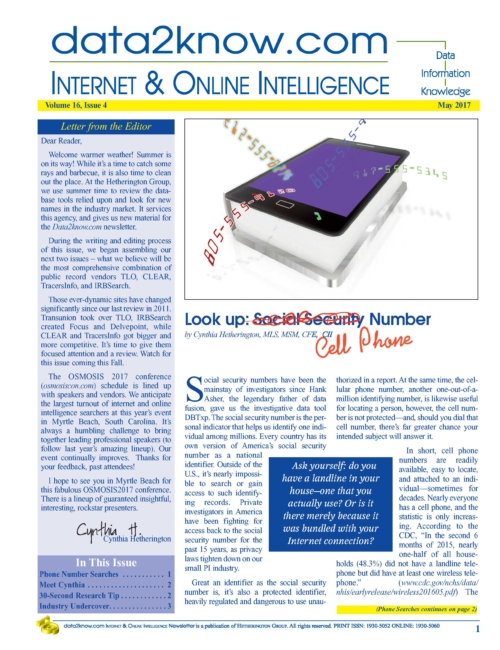-
Data2Know Vol. 15, No. 1
$15.00Not-so private egos: Emojis to Instagram
An overwhelming majority of online posters are now writing with imagery. They are no longer limited to words alone but can convey a thousand words with one photo. With this article, we will both use and make use of that overabundance of communication. -
Data2Know Vol. 15, No. 2
$15.00Barbarians @ The Gate
This article’s title, Barbarians @ The Gate, refers to the threats that any security officer responsible for the safety of people, property, and reputation faces. Are you ignoring social media because it’s bad, it is too much information, or you feel you are smarter than that to use it? -
Data2Know Vol. 15, No. 3
$15.00Know Your Candidate
Discretion is imperative in investigative work. Locating any and all information on opposing parties is viewed as clandestine and made for TV espionage, no matter how open source and obvious the investigating may be. Kim’s accounting of her case and the client’s behavior—and most importantly, the research tactics she used—should serve as a primer for your future candidate investigation cases. -
Data2Know Vol. 15, No. 4
$15.00Due Diligence Investigations: A Primer
Due diligence investigations give a thorough reporting about a subject, based on the client’s needs. Truthfully, an investigator is hired to bring a sense of both resolution and comfort to the client. Prior to an investigation, the client is in a state of flux; unsure, the client does not fully know or understand the circumstances around a person, an event, or a company. An investigator is hired to conduct an investigation, producing information that will help the client be comfortable with the decisions he or she must make. It is the client’s desire to learn more that drives them to our office. -
Data2Know Vol. 15, No. 5
$15.00FRAML Investigations
The term FRAML stands for fraud detection and anti-money laundering. Criminals committing fraud need to launder the proceeds of their crimes through the financial system. Those responsible for financial crimes must connect the dots between fraud and money laundering. Spotting possible money laundering activity might alert the investigator to possible fraud victims, and vice versa. -
Data2Know Vol. 15, No. 6
$15.00Google & Friends for Locating Public Information
This article examines the creative searching features and offerings provided by search engines. Using these advanced techniques greatly enhances the searching of public information. Learn how to get the most out of Google; it's preferred results, operators, symbol functions, proximity searching and more. -
Data2Know Vol. 15, No. 7
$15.00Finding Assets Online Some of the hardest work an investigator can do is asset searches. With bank accounts and trust funds protected by federal law, finding creative and legal methods for locating leads is definitely the way to go. This is not a comprehensive article on all the ways to search for assets. It is a primer on how to use well known OSINT and social media resources for finding money. -
Data2Know Vol. 15, No. 8
$15.00Protecting Your Image Online
With a good Google search, somebody can find where you live, discover your likes and dislikes, learn what you do with your free time, or what others might think of you. Perhaps even habits you would likely not want known, particularly by coworkers. It is a serious matter for anyone, professional or otherwise, concerned with their own personal security. Have you Googled yourself lately? https://www.hetheringtongroup.com/product/data2know-vol-15-no-8/ -
Data2Know Vol. 16 No. 2
$15.00Industry Sources for Every Investigator
One of the challenges with due diligence research is that the industry in which we are investigating is ever-changing. Each industry has its own publications, news, social media forums, and data collections. One example is the medical industry. Cardiologists have their own magazines, associations, and data producers, and you need to search within all those industry resources if you are conducting research on a cardiology group. Research gets tougher with unique occupations—such as waste management, philosophers, and DVR manufacturers. Each has its own panoply of information producers. This article focuses on the WHERE to find information, rather than the always important WHAT. -
Data2Know Vol. 16, No. 4
$15.00Look up: Cell Phone Number
Social security numbers have been the mainstay of investigators since Hank Asher, the legendary father of data fusion, gave us the investigative data tool DBTxp. The social security number is the personal indicator that helps us identify one individual among millions. The cellular phone number, another one-out-of-a million identifying number, is likewise useful for locating a person, however, the cell number is not protected—and, should you dial that cell number, there’s far greater chance your intended subject will answer it. -
Data2Know Vol. 16, No. 5
$15.00Public Records Search Pitfalls
This article focuses on some of the pitfalls that the modern investigator needs to be wary of when it comes to public record searching. Learn some of the issues you may come across and how to avoid them. Additional commentary from experts in the public records fields gives further insight into the public records industry.

